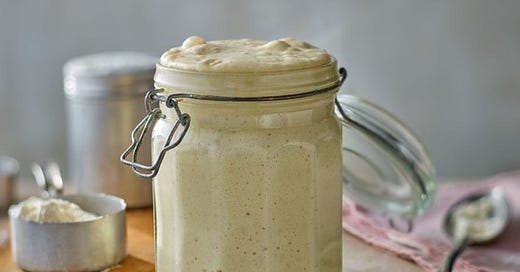ANCESTRAL EATING: GRAINS III (FERMENTATION)
Our ancestors fermented plant foods, especially grains, and so should you. It's much better for you
Welcome to another part in this multi-part examination of grain consumption. In the first part of this sub-series, I established three important points which serve as guiding principles for navigating the various issues associated with grain consumption:
Humans, or rather some humans, have a deep history of consuming grains, in wild form, that may stretch back at least 100,000 years.
The vast majority of people throughout history have probably consumed few if any grains in their diet.
You can display what Weston Price called “perfect health” by eating grains or by not eating grains.
My basic point about grains is that you can eat them to maintain perfect health, but you don’t have to. At the end of the day, I think it comes down to your individual preferences, including the availability of high-quality heirloom or “ancient” varieties of grain and your ability to process them in suitable ways to neutralise the anti-nutrients within them and minimise the negative effects of gluten if it is present, and your personal tolerance for grains and especially gluten-containing grains.
Some people just can’t eat any gluten at all, while others tolerate it well, even the more aggressive modern varities, without any obvious side effects. You’re only likely to discover your tolerance with experimentation, such as a period of eight or 12 weeks without gluten. Giving up gluten for a “trial period” convinced me that I needed to eliminate wheat from my diet; although I’ve since reintroduced homemade organic rye sourdough bread to my diet, with some success.
Last week, I examined a provocative essay called “Bread and Other Edible Agents of Mental Disease”. The authors make the claim that gluten-containing grains, and especially modern varieties of wheat, are closely linked to mental illness, gut disorders and inflammatory conditions including arthritis. The authors recommend that a grain-free diet “could improve the mental health of many and be a complete cure for others.” Broadly, from personal experience and consideration of the evidence, I believe this to be true. At the very least, I recommend that, if you are going to consume grains that contain gluten, you should select varieties such as einkorn, spelt or rye, which contains smaller amounts of gluten, and of a less harmful variety, than modern wheats, and you should ensure they are treated properly before you consume them. That means fermentation.
Here I’m going to tell you about the importance of fermentation: what it does (not just to grains), why that’s good, and how you can get started with a fermentation project of your own, a sourdough starter. In further instalments, I’ll show you how to bake my favourite bread, sourdough rye pumpernickel, and how to make other kinds of fermented food like sauerkraut and even homemade Tabasco sauce, which is surprisingly easy to make and also so much better than the stuff you buy in the stores.
Egyptians set aside their dough until it decayed, and observed with pleasure the process that took place.
This description, taken from the ancient Greek historian Herodotus in the fifth century BC, may be the first written description of the process of bread fermentation. A wheat dough is made with flour, water and maybe some seasoning, then left to one side, somewhere nice and warm, like next to the hearth, until a physical process takes place that observers find pleasurable. Herodotus probably meant not only how the dough started to smell, but also how it gradually rose, becoming as much as twice its original size.
How fermentation was first discovered by our ancestors is unclear. The discovery could just as easily have been a fortuitous mistake — a forgotten batch of bread dough that was rediscovered, a clay mug of watery dough or honey-water that was left and then found to have turned alcoholic — as a product of deliberate experimentation. Preservation of food was a matter of life or death. We’ll never know.
Bread fermentation takes place through the lifecycle of micro-organisms, especially yeasts, that colonise the dough and begin digesting it, producing gas and byproducts that give bread its characteristic taste and texture, as well as making it more digestible. Although today modern bakers prefer to use commercially produced varieties of yeast that are fast-acting and reliable, for the longest period of time — since the dawn of fixed-field agriculture and maybe even before that — people have been harnessing the power of naturally occurring yeasts in the air and on the grains themselves, to ferment bread. Commercial yeasts also ferment the dough, but they do so much quicker and in a way that is less thorough than the slower, traditional “sourdough” fermentation method. This is one of the main reasons why many people struggle with digestive issues when they eat cheap supermarket bread, but feel totally different when they bake their own sourdough bread with high-quality ingredients or buy an expensive artisan loaf.
It’s worth noting, before we go any further, that fermentation is just an extension of what happens in your gut, only it’s taking place outside your gut. The average human colon contains over 800 species of microbe and a minimum of 7,000 strains, all of which play a role in the complex process of digestion. Micro-organisms, as Catherine Shanahan notes, aren’t “picky” about where they live. All they need are the right conditions — consistent temperature, the presence of water and the right nutrients — and then they’ll get to work.
Keep reading with a 7-day free trial
Subscribe to In the Raw to keep reading this post and get 7 days of free access to the full post archives.






